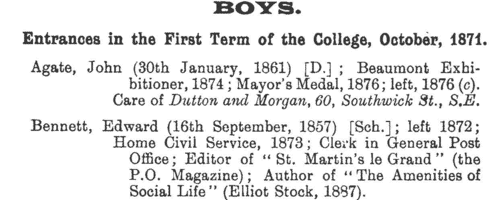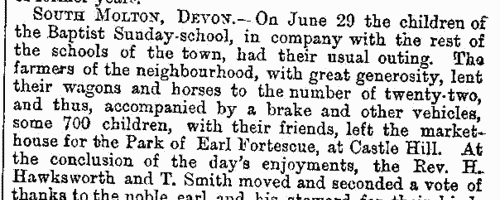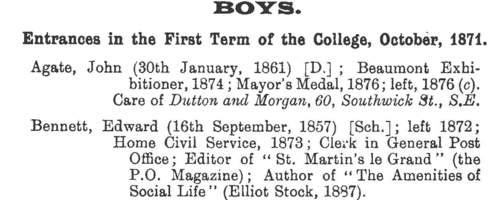Knocker Surname Ancestry ResultsOur indexes 1000-1999 include entries for the spelling 'knocker'. In the period you have requested, we have the following 100 records (displaying 51 to 60): Single Surname Subscription | | | Buying all 100 results of this search individually would cost £560.00. But you can have free access to all 100 records for a year, to view, to save and print, for £100. Save £460.00. More... |
These sample scans are from the original record. You will get scans of the full pages or articles where the surname you searched for has been found. Your web browser may prevent the sample windows from opening; in this case please change your browser settings to allow pop-up windows from this site. East Kent Registered Electors: Dover District
(1865)
The poll for two knights of the shire to represent the Eastern Division of the county of Kent in parliament was taken 18 July 1865, the candidates being Sir Edward Cholmeley Dering, bart., (D), Sir Brook William Bridges, bart., (B), and Sir Norton Joseph Knatchbull, bart., (K). This poll book lists all registered electors, whether they voted or not, by electoral district (Ashford, Canterbury, Dover, Faversham, Hythe, Margate, Ramsgate, Romney, Sandwich, Sheerness, Sittingbourne, Whitstable and Wingham) and then by township or parish within which lay the property whereby the electors had qualified. The lefthand column gives sequential number in the whole volume; then follows the elector's full name, surname first, and his address (often elsewhere); and on the righthand side for whom he voted. When the elector was qualified in duplicate the vote is recorded opposite to the number upon which he claimed to vote at the polling booth, and wherever his name occurs elsewhere a reference is made, immediately after the address, to the number where his vote is recorded, with the initials of the candidates for whom he voted. Duplicate voters who were dead at the time of the election, or did not vote, are printed in italics to signify that they did not vote, or are stated to be dead once only; and wherever the names of such electors occur elsewhere references are made to the numbers where alone they are reckoned in the abstract of the poll as dead or not voting. Whenever a number only, without any other reference, follows the address, it denotes that at the number referred to, the elector is entered as not voting. In addition, at the end of each district there is this list of persons whom had claimed and were registered to vote in the district, in which their places of abode were situate, or who were not resident in the county of Kent.KNOCKER. Cost: £6.00.  | Sample scan, click to enlarge

| East Kent Registered Electors: Hougham
(1865)
The poll for two knights of the shire to represent the Eastern Division of the county of Kent in parliament was taken 18 July 1865, the candidates being Sir Edward Cholmeley Dering, bart., (D), Sir Brook William Bridges, bart., (B), and Sir Norton Joseph Knatchbull, bart., (K). This poll book lists all registered electors, whether they voted or not, by electoral district (Ashford, Canterbury, Dover, Faversham, Hythe, Margate, Ramsgate, Romney, Sandwich, Sheerness, Sittingbourne, Whitstable and Wingham) and then by township or parish within which lay the property whereby the electors had qualified. The lefthand column gives sequential number in the whole volume; then follows the elector's full name, surname first, and his address (often elsewhere); and on the righthand side for whom he voted. When the elector was qualified in duplicate the vote is recorded opposite to the number upon which he claimed to vote at the polling booth, and wherever his name occurs elsewhere a reference is made, immediately after the address, to the number where his vote is recorded, with the initials of the candidates for whom he voted. Duplicate voters who were dead at the time of the election, or did not vote, are printed in italics to signify that they did not vote, or are stated to be dead once only; and wherever the names of such electors occur elsewhere references are made to the numbers where alone they are reckoned in the abstract of the poll as dead or not voting. Whenever a number only, without any other reference, follows the address, it denotes that at the number referred to, the elector is entered as not voting. KNOCKER. Cost: £6.00.  | Sample scan, click to enlarge

| East Kent Registered Electors: Hythe District
(1865)
The poll for two knights of the shire to represent the Eastern Division of the county of Kent in parliament was taken 18 July 1865, the candidates being Sir Edward Cholmeley Dering, bart., (D), Sir Brook William Bridges, bart., (B), and Sir Norton Joseph Knatchbull, bart., (K). This poll book lists all registered electors, whether they voted or not, by electoral district (Ashford, Canterbury, Dover, Faversham, Hythe, Margate, Ramsgate, Romney, Sandwich, Sheerness, Sittingbourne, Whitstable and Wingham) and then by township or parish within which lay the property whereby the electors had qualified. The lefthand column gives sequential number in the whole volume; then follows the elector's full name, surname first, and his address (often elsewhere); and on the righthand side for whom he voted. When the elector was qualified in duplicate the vote is recorded opposite to the number upon which he claimed to vote at the polling booth, and wherever his name occurs elsewhere a reference is made, immediately after the address, to the number where his vote is recorded, with the initials of the candidates for whom he voted. Duplicate voters who were dead at the time of the election, or did not vote, are printed in italics to signify that they did not vote, or are stated to be dead once only; and wherever the names of such electors occur elsewhere references are made to the numbers where alone they are reckoned in the abstract of the poll as dead or not voting. Whenever a number only, without any other reference, follows the address, it denotes that at the number referred to, the elector is entered as not voting. In addition, at the end of each district there is this list of persons whom had claimed and were registered to vote in the district, in which their places of abode were situate, or who were not resident in the county of Kent.KNOCKER. Cost: £6.00.  | Sample scan, click to enlarge

| Boys entering Dover College
(1873)
The second edition of the Dover College Register, edited by William Stevens Lee, lists all boys entering the school from its opening in 1871 to the date of publication in 1899. The boys are listed alphabetically by term of entry, surname and full christian names. A double dagger after the name indicates a school prefect. Next comes the year or date of birth, then abbreviations indicating house - [D] day boy; [Sch.] School House; [Sp.] Sparke's House; [St.] Steedman's House; [W.] Walters' from 1881 to 1886, Williams' from 2nd term 1890 to 3rd term 1898; [L.] Littlewood's (the same house as Walters') fom 3rd term 1886 to 1st term 1890. From 3rd term of 1892 onwards the names were changed to [S.] School House; [P.] Priory House (was Sparke's); [M.] St Martin's (was Williams'). Moreover, in January 1893 the Junior School was established at West Mount, and from then onwards [J] indicates a period there. Next come distinctions gained in the school, exhibitions, &c., and athletic distinctions, such as XI for membership of the school cricket eleven, XV for the school football team, with years; then date of leaving; distinctions gained since leaving; and present address (where known) as of 1899. Despite this attempt at comprehensive coverage, the materials to hand for compiling the register were often lacking: at worst, in the early years, there are a handful of entries where only the surname is given. Equally, other entries are detailed and comprehensive. KNOCKER. Cost: £4.00.  | Sample scan, click to enlarge

| The London & County Banking Company Shareholders
(1873)
Copy of the return by the London and County Banking Company to the Inland Revenue listing the 'persons of whom the Company or partnership consists', pursuant to 7 & 8 Vic. cap. 32: giving full name (surname first), residence and occupation.KNOCKER. Cost: £4.00.  | Sample scan, click to enlarge

| Baptists
(1876)
The Baptist was a weekly newspaper, with some general news and political coverage, but mainly devoted to chronicling Denominational Intelligence, i. e. the doings of the Baptist churches in Britain and Ireland. July to December 1876.KNOCKER. Cost: £6.00.  | Sample scan, click to enlarge

| Gravestones in the British New Cemetery, Sant Rocco, the Ionian Islands
(1870-1879)
The Ionian Islands were occupied by British forces in 1809-1814, established as a British protectorate in 1815, and ceded to Greece in 1864. Otho Alexander, British Vice-Consul there, about 1900 transcribed the surviving legible inscriptions from the British New Cemetery at Sant Rocco, as well as those at Paxo and Santa Maura cemeteries. KNOCKER. Cost: £4.00.  | Sample scan, click to enlarge

| Money lenders and other creditors
(1880)
Bills of sale transferred title in all property of a debtor to a specified creditor. Possession of a bill of sale thus protected a money lender or other creditor from losing a debtor's property to other creditors (except landlords) in case of insolvency or bankruptcy; and in many cases signing a bill of sale was a required step for a borrower securing a loan. The bill of sale specified the amount thereby secured, but could be open, i. e., allow for further drawings on the same account. Entries from the official register of bills of sales in England and Wales were published in Flint & Co.'s London Manchester and Dublin Mercantile Gazette, a weekly publication available only by subscription, issued under the motto "Security in Crediting". The entries are listed by county, then alphabetically by debtor, surname first, with address, trade, the name of the creditor ('in whose favour'), dates of issue and filing, and amount. An &c. after the amount indicates an open bill. The creditors that appear in the 'in whose favour' column are mainly, but not exclusively, loan companies and individual money lenders, and Jewish names figure prominently among the latter. When a loan was paid off, satisfaction of the bill of sale was entered on the register, and these satisfactions are also recorded in these pages. 1 January to 31 March 1880.KNOCKER. Cost: £6.00.  | Sample scan, click to enlarge

| Bankrupts, Assignees, Trustees and Solicitors
(1881)
Bankruptcy notices in England and Wales, October to December 1881KNOCKER. Cost: £6.00.  | Sample scan, click to enlarge

| Boys entering Dover College
(1881)
The second edition of the Dover College Register, edited by William Stevens Lee, lists all boys entering the school from its opening in 1871 to the date of publication in 1899. The boys are listed alphabetically by term of entry, surname and full christian names. A double dagger after the name indicates a school prefect. Next comes the year or date of birth, then abbreviations indicating house - [D] day boy; [Sch.] School House; [Sp.] Sparke's House; [St.] Steedman's House; [W.] Walters' from 1881 to 1886, Williams' from 2nd term 1890 to 3rd term 1898; [L.] Littlewood's (the same house as Walters') fom 3rd term 1886 to 1st term 1890. From 3rd term of 1892 onwards the names were changed to [S.] School House; [P.] Priory House (was Sparke's); [M.] St Martin's (was Williams'). Moreover, in January 1893 the Junior School was established at West Mount, and from then onwards [J] indicates a period there. Next come distinctions gained in the school, exhibitions, &c., and athletic distinctions, such as XI for membership of the school cricket eleven, XV for the school football team, with years; then date of leaving; distinctions gained since leaving; and present address (where known) as of 1899. Despite this attempt at comprehensive coverage, the materials to hand for compiling the register were often lacking: at worst, in the early years, there are a handful of entries where only the surname is given. Equally, other entries are detailed and comprehensive. KNOCKER. Cost: £4.00.  | Sample scan, click to enlarge

|
Research your ancestry, family history, genealogy and one-name study by direct access to original records and archives indexed by surname.
|












